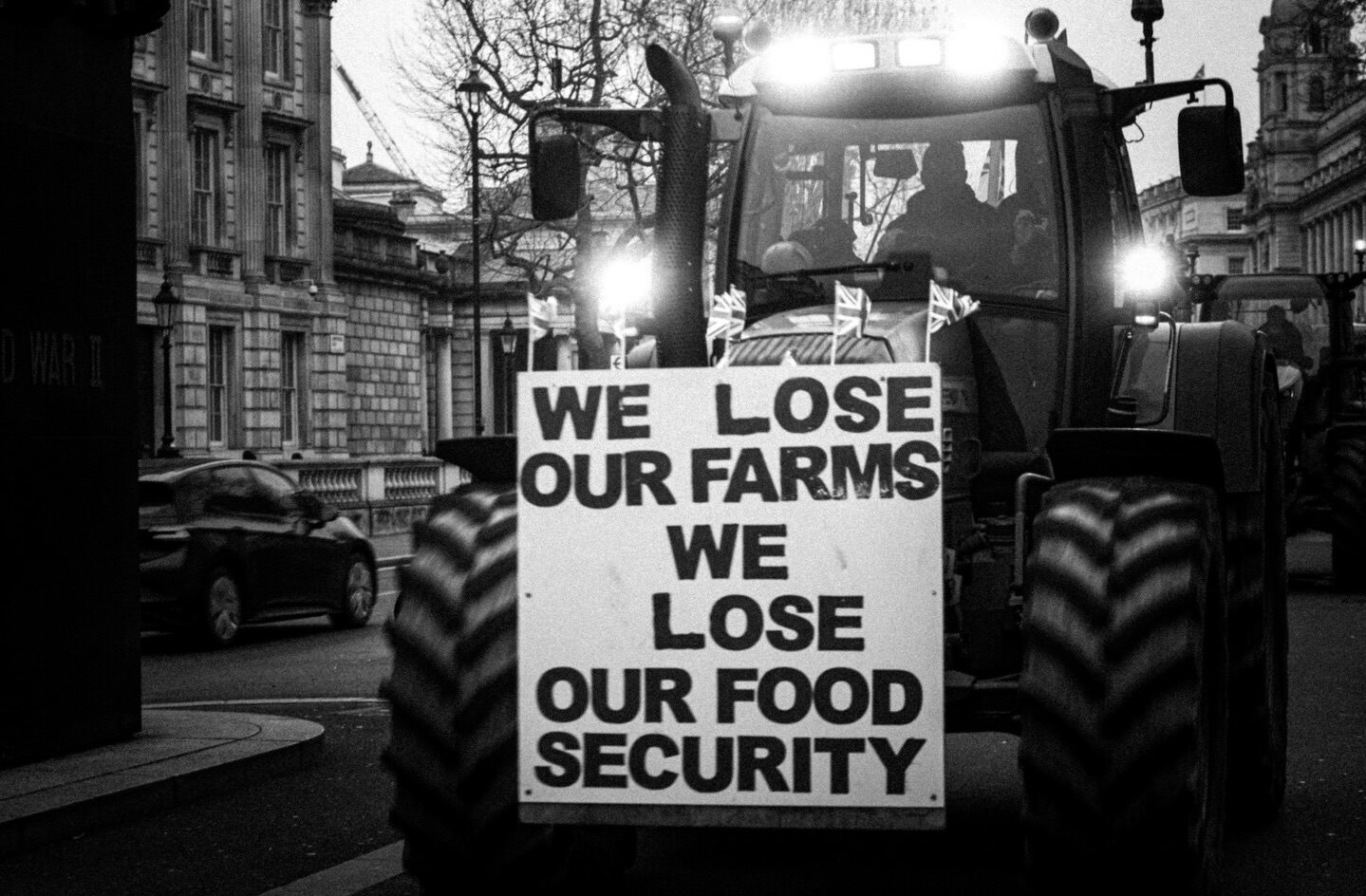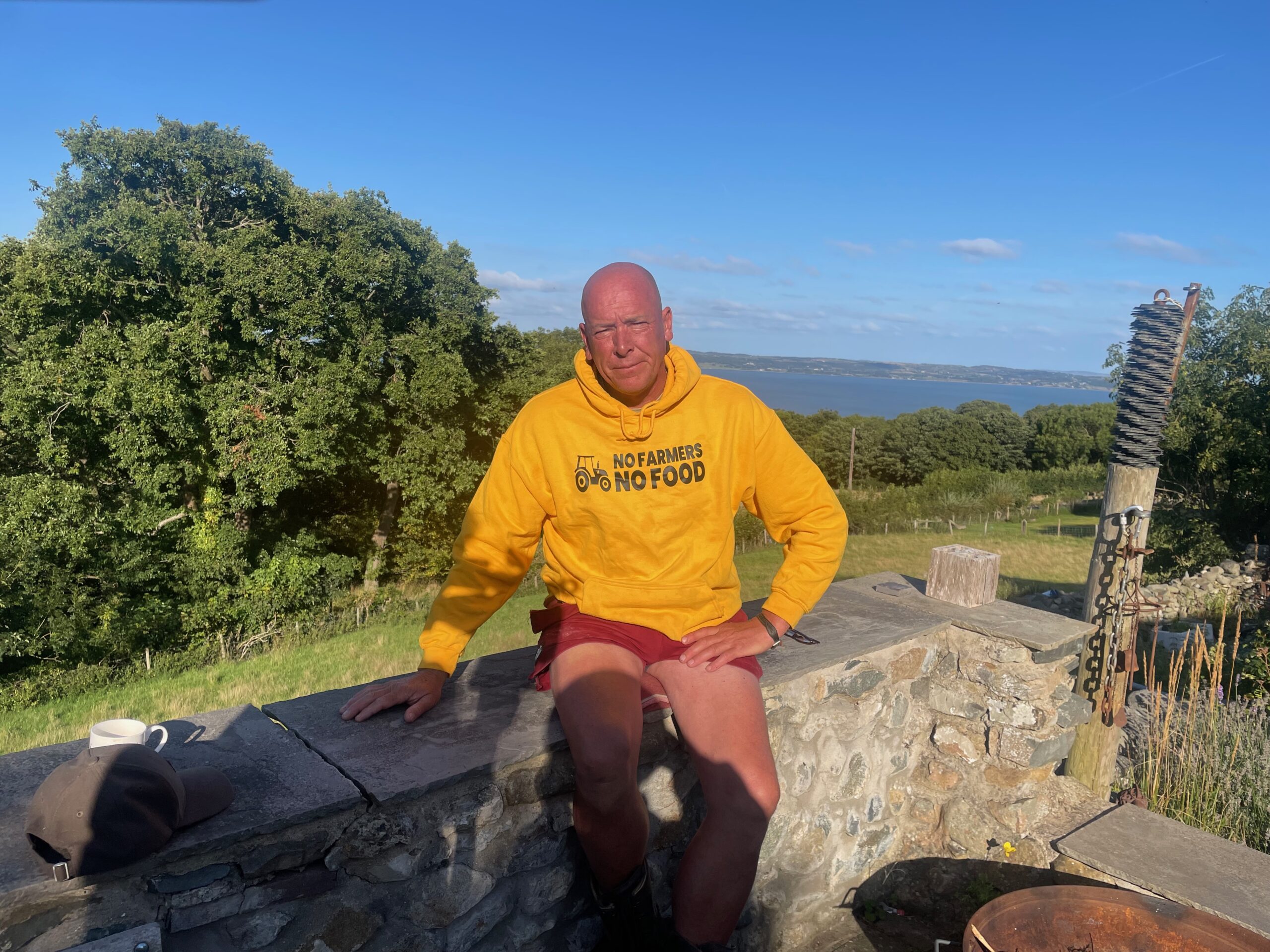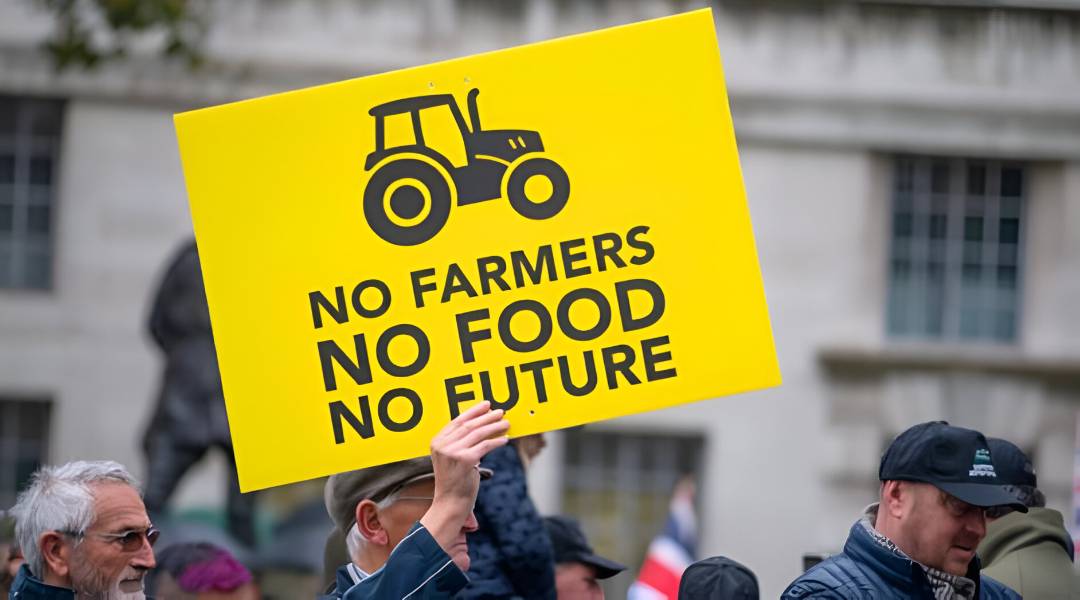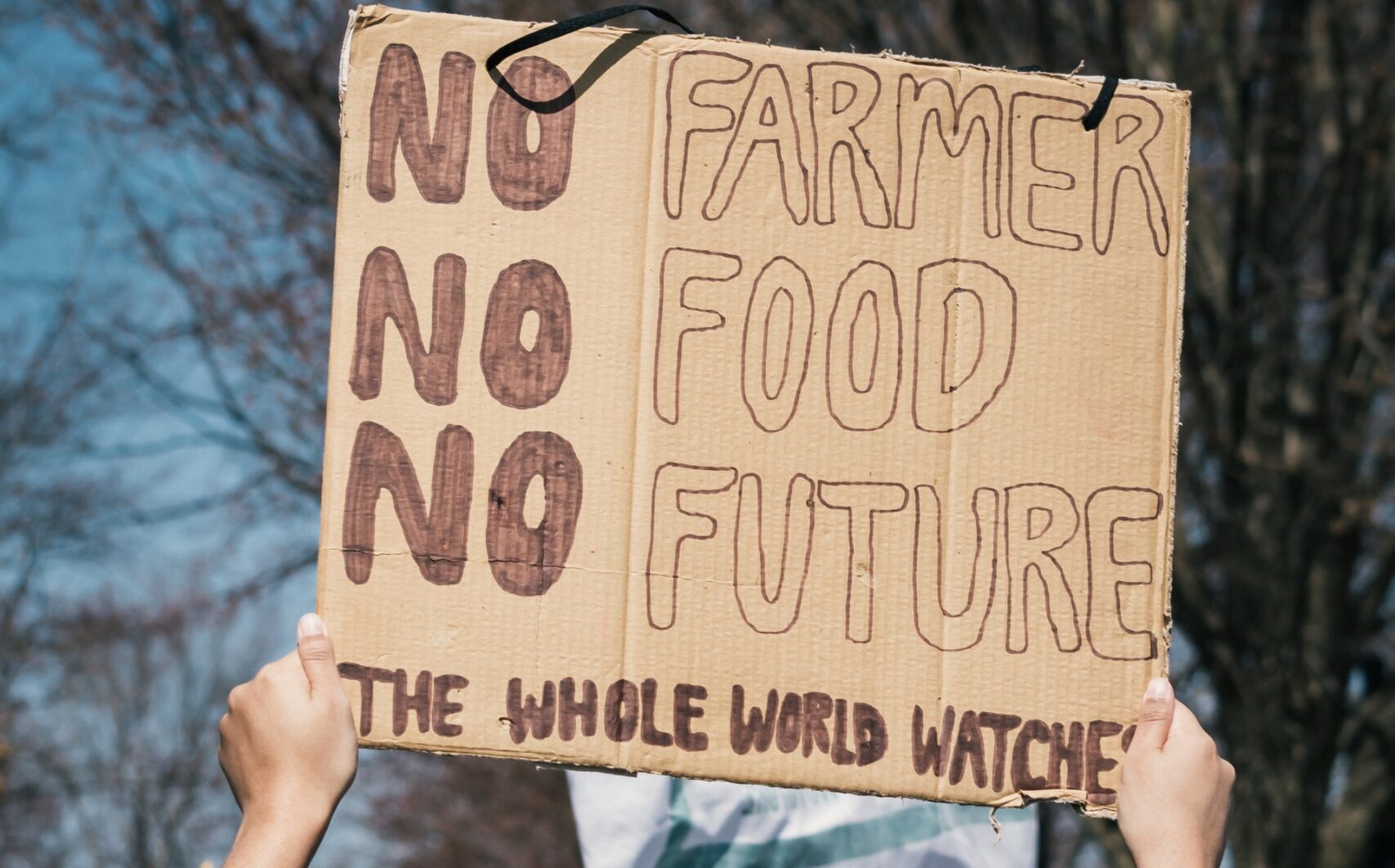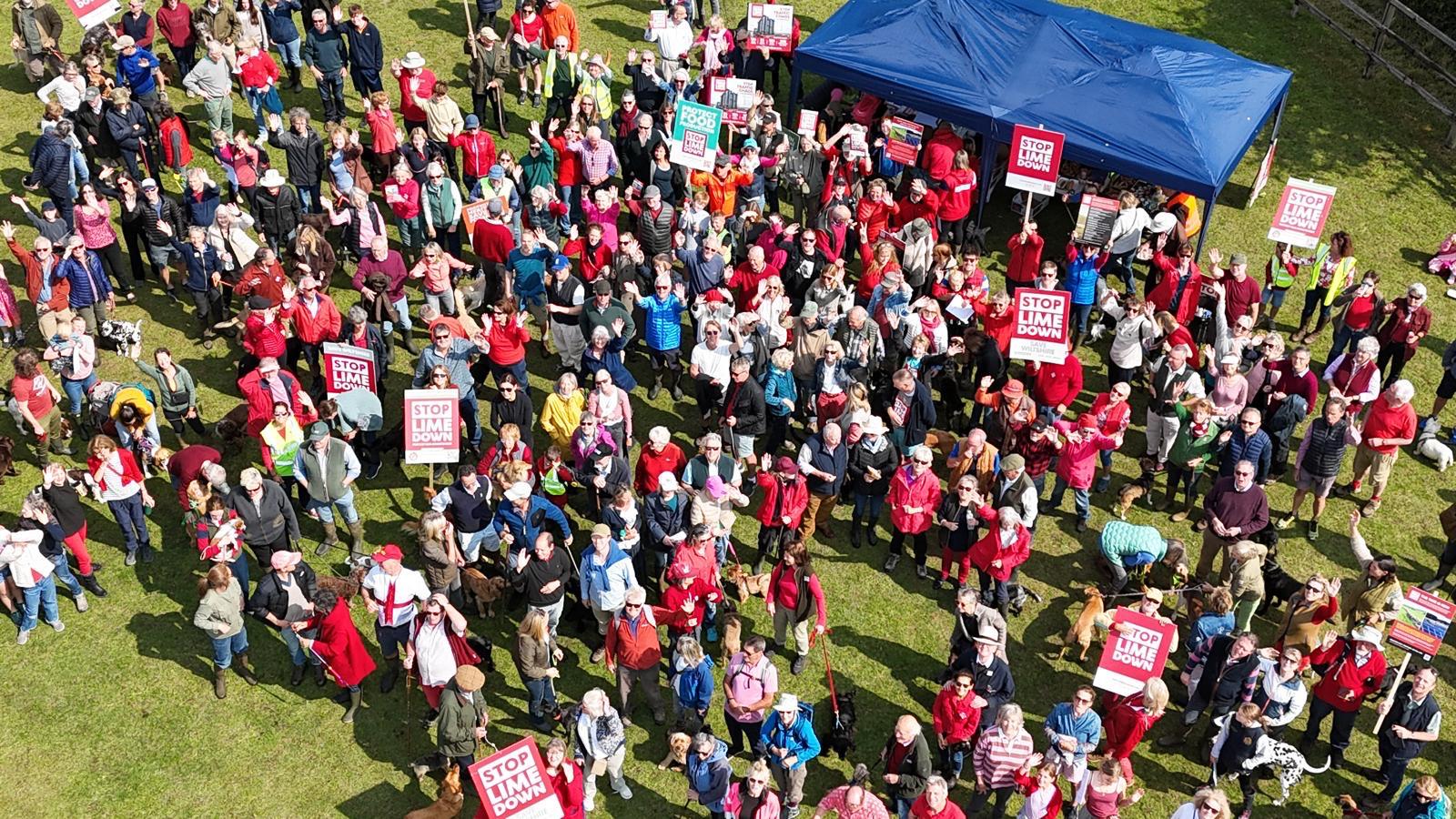? Rooting for Real Farms
If we don’t support our local small scale farms & high welfare independent butchers and retailers now and into the future, we will lose them. Craig runs The Good Life Projects in Shepton Mallet. His core belief is that, in order for us to live ‘The Good Life’, we have to work with nature and ensure its preservation. The farm currently has 11 pasture raised pigs which consist of Large Blacks, Sandy Blacks, and Gloucester Old Spots. Craig says, “Our sausages and pork products are produced in Somerset, slaughtered in Somerset, packed in Somerset, and sold in Somerset. We only sell to people in a 10 mile radius, so our pork goes a maximum of 30 miles before it gets to people’s plate. Eat British Heritage Breed pigs or lose them. Buy pork directly from local farmers and ask the butchers where the pork comes from.”
? Why is the UN Food Systems Summit silent on land grabs?
Peasant groups and small scale farming advocates across the globe are alarmed that the upcoming UN Food Systems Summit (UNFSS) is promoting the continuation of corporate owned, chemical intensive, large scale high tech farming practices. Though the summit is part of the so-called Decade of Action – a pledge by world leaders to accelerate efforts to achieve all the UN’s 17 Sustainable Development Goals (SDGs) by its 2030 deadline – the UNFSS has so far been silent on land grabs and the ongoing ‘consolidation’ of community-owned village land into private hands.
The 29th of March has been dubbed the Day of the Landless which pays tribute to the founding of the Asian Peasant Coalition (APC). About 15-million strong, the APC was established in 2003 by more than 20 organizations from 11 countries representing farmers, landless peasants, fishers, agricultural workers, Dalits, indigenous peoples, herders and pastoralists, and rural women and youth. They warn that the UNFSS “will only end up in legitimizing and further advancing tighter imperialist control over food and agriculture.”
The Asian Peasant Coalition is asking organisations to sign a statement that calls for,
‘an end to corporate control in agriculture and food systems. It is unacceptable that farmers and food producers who feed nations do not have access to land and are food insecure as a result of land and resource grabs, and of global monopolies in agricultural production and trade. Farmers and peasants can settle for nothing less than genuine land reform and rural development towards the true transformation of the world’s food systems. We recognise that the key to this transformation are solid people’s organisations and a global mass movement, the only real spring of change amid a decaying world order.’
? Homogenisation of agriculture
Dr Agnes Kalibata, the appointed Special Envoy to the 2021 UN Food Systems Summit, is also president of Bill Gates’ brainchild, the Alliance for a Green Revolution in Africa (AGRA). Gates, the main funder of AGRA is no stranger to land consolidation as he has recently been recognised as the biggest owner of farmland in the US making further homogenisation of agriculture all the more inevitable.
Disappointingly, AGRA are prioritising high tech advances over crop diversity which could have serious consequences for food security. AGRA seeks to support the agribusiness model of growing 3-4 crops in selected countries to make their business more profitable and there is little concerted effort to support a diversity of crops or to bolster the huge variety of traditional vegetables that have been naturalised in their environment, offering nutritional and natural diversity. This is despite one of the action tracks of the UNFSS being a shift to sustainable consumption patterns to ensure access to safe and nutritious food for all and to build resilience to vulnerabilities, shocks and stress. These action points would be far better delivered entirely by agro-ecological farming and the production of a wide variety of crops for local consumption rather than predominantly commodity cash crops for export.
? African farmers revolt
Despite hundreds of years of destructive colonialism and now AGRA’s full scale assault on small scale farming, pockets of small scale farming communities are rising up. In Kenya, farmers have mobilised under the Small Scale Farmers Forum to sue the Kenyan government over the UK/Kenya trade deal which they say could undermine their local markets. With Kenya and the UK having both blocked travel between their countries to contain Covid infections, the trade agreement has come into focus.
‘Last month, small farmers in Kenya sued to stop the trade deal, arguing the ratification process was flawed as no public participation was conducted by the Kenyan government. The farmers in the Kenya Small Scale Farmers Forum took issue with the agreement that allows an open market with heavily subsidised tariffs for the UK farm products like chicken, pigs and maize. They said the deal has the potential to destroy local production of the same products. Other local traders said that the high cost of production in Kenya raises questions over unfair competition from cheaper imports from the UK. This issue already exists with Chinese imports that have flooded the Kenyan market.’
Though the trade war might jeopardise the UK being a major market for Kenyan tea, coffee, flowers and fresh vegetables, these export companies are globalised businesses that appropriate the land from local farmers, provide poor paying insecure jobs and leave local communities impoverished, evicted from their villages, and vulnerable to exploitation in the overpopulated shanty towns on the fringes of the ‘prosperous’ cities.
? UK overseas aid smacks of recolonisation
Trade treaties that are forcing whole countries into a cycle of providing agricultural commodities for export in order to attain foreign exchange to buy chemicals, machines and GM seed inputs etc to produce yet more exports for the profit of external corporations’, smacks of recolonisation. It is also time the UK government stopped giving so-called ‘overseas aid’ to support this corporate hegemony. Food & Water Europe Food Policy Advisor Eve Mitchell said:
“AGRA is all about making money, but Africans will never see the bulk of it. Among other things, it is not acceptable that UK taxpayer money is being used to turn public genetic resources and traditional knowledge in Africa into privatised crops, especially in conditions of structural increases in food and agricultural input costs. Exporting agricultural techno fixes might seem like a way to reap future profits and put a sticking plaster on the UK economy for a while, but this is at the expense of food producers and consumers in Africa. The UK Government claims all its policy is based on evidence. We’d like to see the basis for the decision to back AGRA.”
? US Billionaire landowners
Like wealth, land ownership is becoming concentrated into fewer and fewer hands, resulting in a greater push for monocultures and more intensive industrial farming techniques to generate greater returns. One percent of the world’s farms now control 70% of the world’s farmlands. The injustice of land accumulating into the hands of a few is a very real phenomenon. Nick Estes, a member of the Native American Lower Brule Sioux Tribe asks ‘why do a handful of people own so much land?’
‘Land is power, land is wealth, and, more importantly, land is about race and class. The relationship to land – who owns it, who works it and who cares for it – reflects obscene levels of inequality and legacies of colonialism and white supremacy in the United States, and also the world. Wealth accumulation always goes hand-in-hand with exploitation and dispossession. In this country, enslaved Black labor first built US wealth atop stolen Native land. The 1862 Homestead Act opened up 270m acres of Indigenous territory – which amounts to 10% of US land – for white settlement. Black, Mexican, Asian, and Native people, of course, were categorically excluded from the benefits of a federal program that subsidized and protected generations of white wealth.’
‘Small farmers and Indigenous people are more cautious with the use of land. For Indigenous caretakers, land use isn’t premised on a return of investments; it’s about maintaining the land for the next generation, meeting the needs of the present, and a respect for the diversity of life. That’s why lands still managed by Indigenous peoples worldwide protect and sustain 80% of the world’s biodiversity, practices anathema to industrial agriculture. The average person has nothing in common with mega-landowners like Bill Gates or Ted Turner. The land we all live on should not be the sole property of a few. The extensive tax avoidance by these titans of industry will always far exceed their supposed charitable donations to the public. The “billionaire knows best” mentality detracts from the deep-seated realities of colonialism and white supremacy, and it ignores those who actually know best how to use and live with the land. These billionaires have nothing to offer us in terms of saving the planet – unless it’s our land back.’
? UK’s billionaire land appropriation
Though the biggest shift in recent years from small to big farms was in the US, this accumulation of land in the hands of a very few landowners has dominated the landscape in the UK for 300 years with James Dyson, the wealthiest person in the UK, now tipping the Royal family for land ownership. An antidote to this corporate land grab in the UK would be for the councils not only to stop selling off their farms that were originally brought to help new entrants, but to start actually buying land for new entrants. Plus, support policies like the One Planet Development in Wales, that supports low impact environmental livelihoods.
? New Agricultural and Development Bank
An invaluable boost to agro-ecological farming might be the Food Farming Countryside Commission’s (FFCC) recommendation that the government set up a new Agricultural and Development Bank to help finance farmers, particularly young people, new entrants and tenant farmers, move into agro-ecological or regenerative farming. Agro-ecology, an umbrella term that covers organic and regenerative farming, is a system that works with nature and reduces harmful inputs such as pesticides, herbicides, artificial fertilisers, soil compaction and continuous monocultures.
“It is clear a transition to agro-ecology could help address multiple challenges; the climate and nature emergencies, the public health crisis and now a fair and green post-covid economic recovery,” said FFCC chief executive, Sue Pritchard.
? Low-intensity, low input and ecological farming can feed the EU
‘Compelling’, ‘seminal’ and even ‘Utopian’ are just some of the words being used to describe a French study that has worked out how a growing population of Europe could be fed a healthy diet, produced by a mass increase of low-intensity, low input and ecological farming.’
‘The findings are striking. The authors used average organic yields for crops in Europe to model exactly how much of what crop could be grown where. Despite overall yield decreases of an average of 35 per cent, compared to yields in non organic systems using chemicals, the findings show there could be enough food produced under an ecological system to feed the predicted 530 million Europeans by 2050.’
⛔ Conflict of interest for the Environment Agency
Despite the emphasis on low input farming in the government’s public money for public goods subsidy system, the Environment Agency pension funds are invested in chemical companies that make pesticides that are banned in the UK and Europe due to the harm they cause to bee populations.
Not only is this hypocritical but a conflict of interest as the UK government announced it would investigate the threat PFAS (known as ‘forever chemicals’ because they don’t break down, leading to ever increasing contamination) pose to public health, with the Environment Agency set to play a key role in the investigation.
The Environment Agency is in charge of monitoring chemical pollution in England, and is expected to levy fines against companies or individuals they have invested in that are causing significant harm to the environment.
Nick Mole, policy officer at the Pesticide Action Network, told the reporter from i news: “At best there is a distinct double standard and at worst a serious conflict of interest.”
“The main purpose of the EA is to protect the environment with a key focus on stopping pollution,” he continued. “For them to be invested in companies that produce some of the most pernicious environmental pollutants is simply outrageous. PAN UK is calling on the EA to divest its pension portfolios of all connections to the pesticide industry.”
✅ Local small scale farm solutions
Free trade is only free for corporations to comb the globe for the cheapest products while the rest of us pay. The price of restoring soils and repairing ecological damage to biodiversity, watercourses and hedgerows caused by industrial farming is borne by the taxpayer in the now-familiar cycle of socialism for the rich and capitalism for the poor, devastation for the planet and starvation for future generations. A very good example of the revolt against the corporate takeover of agriculture is the millions of farmers protesting in India for the retention of laws that ensure corporations don’t undercut their cost of production.
⚖️ Factory pig farming on trial
The disaster-prone atrocity that is factory pig farming has given us yet another horrific nightmare; 55,000 pigs have been burned alive on a factory pig farm next to the historic village of Alt Tellin in NE Germany. In 2012 when the farm was being built by the infamous serial factory pig farmer Adriaan Straathof, local people protested because they knew that the pigs would suffer unimaginable cruelty in the barren steel pens and that the stench would damage neighbours’ health, make their homes unliveable and end any possibility of local businesses being able to make income from tourism in the historic area. They also warned that the plans did not include any way to evacuate the pigs safely in the event of a fire. While on the anti-factory farm march in Berlin in 2013 my partner and I met Jorg Kroger, one of the people organising the protest which included vigils in the freezing cold at the site of the new pig factory.
The protestors were right, the factory caused misery to thousands of people and hundreds of thousands of pigs and soon things began to go badly for Straathof. In May 2013 a court in Magdeburg ordered him to reduce the number of pigs in one of his factories from 50,000 to 11,000, the number that the court said had been specified in the original agreement that Straathof had exceeded.Then in October 2019, in a ground-breaking verdict, the first of its kind in Europe, Straathof was given a suspended prison sentence for keeping mother pigs in steel cages so narrow they did not meet even the minimum legal dimensions. The undercover filming by Animal Rights Watch that led to the investigation into Straathof’s inhumane pig factories can be seen here (warning, distressing images).
? Pigs freeze to death
When dealing with tens of thousands of animals, the likelihood of an accident is far higher and the impact on the animals, the surrounding ecosystem from pollution and people’s health is far greater. Associated Press reported on 2 April that the animal rights group PETA had revealed that 91 pigs had died of hypothermia while being transported in trucks in temperatures of -27F at a Smithfield farm in Nevada.
“Leaving pigs for extended periods on trucks to incur large, painful frostbite injuries and endure a prolonged death are not the commonly accepted practices of commercial livestock operations that are otherwise exempt from prosecution,” PETA investigator Colin Henstock wrote in his letter to the sheriff.
Again when there are too many animals any glitch in the process will have a massive impact on the wellbeing of the animals. Joaquin Phoenix’s ‘Gunda’ film should be shown on mainstream TV and in schools to ensure shoppers are aware that the food we eat is from an animal that has feelings like us. This is a Meditative Documentary To Experience Farm Animals On Their Own Terms.
? Subsidising a failed system
If there are system failures in factory farming, why not change track instead of constantly bailing out a failed system. In overcrowded factory farms, because animal diseases among immuno-compromised livestock are rife – BSE, foot and mouth, bird flu, and animal-related human diseases like Nipah and swine flu, or because of shocks like lockdowns, loss of export markets and Brexit-related delays, the taxpayer is constantly paying to bale out an unstable industry which lacks resilience because global markets, single breed livestock and long supply chains are so vulnerable. Presently pig producers in England are calling for a £3.2 million government bailout to compensate them for losses caused by delays to lorries exporting pigs to Europe and, with Covid outbreaks in packing houses, slower processing capacity that has lead to a backlog of finished pigs on farms, consuming feed and becoming heavier than the economic weight. The average loss per pig in England has now reached £15.
Meanwhile small and medium scale high welfare pig farmers with hardy ancient breeds are trading locally and reporting astoundingly good sales during the pandemic. Every week we hear from another family pig producer whose pork boxes are selling rapidly because they are operating in real markets that are flexible and organic to the needs of local people and less susceptible to delays as in long protracted food chains and have never received taxpayers subsidies to bail them out when times get rough. Covid has been a wakeup call to the benefits of small scale independent farmers but if we want them to survive we need to continue to buy their produce.
Please donate
Forgive me for pointing out that, while we receive some one-off donations, I am funding Farms Not Factories myself, and if we are to continue to fight the cruel, antibiotic-led factory farm system, we will need some regular donations from like-minded people. Please consider a monthly subscription of £2/month and help us support a network of smaller scale, humane and healthy UK pig farms, local abattoirs and butchers.
“Our message is simple, we want to help bring an end to this dangerous, inhumane system. Vote for real farming over factory farming.”
– Tracy Worcester, Director
Contents
Share This Article
Related ArticlesView All
Protect UK Farmers from Low Standard Imports
The purpose of our newsletter is to give you important information that is censored in the mainstream media. “The way… Read More
Protectionism vs So-Called Free Trade
The purpose of our newsletter is to give you important information that is censored in the mainstream media. “The way… Read More
Find A Farmer
The purpose of our newsletter is to give you important information that is censored in the mainstream media. “The way… Read More
Zionist Money Rules
The purpose of our newsletter is to give you important information that is censored in the mainstream media. “The way… Read More
The Price of Progress
The purpose of my newsletter is to give you important information that is censored in the mainstream media. “The way… Read More
Silencing Dissent Through Fear
The purpose of my newsletter is to give you important information that is censored in the mainstream media. If you… Read More

